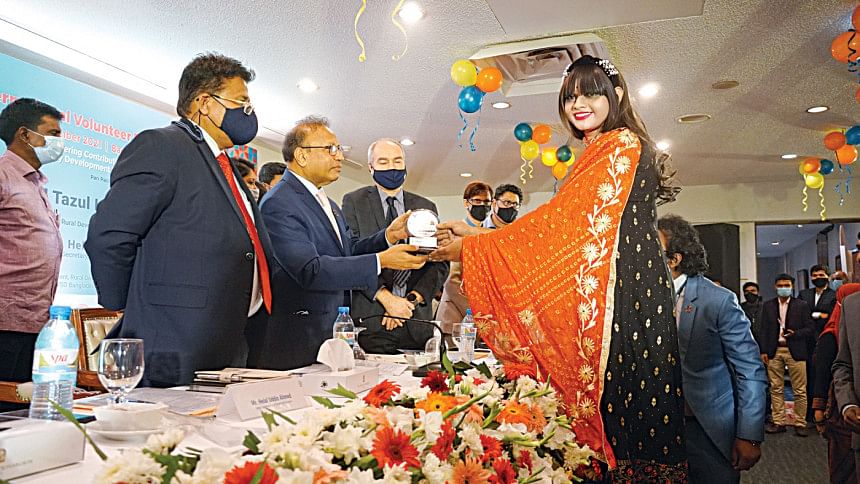Towards an inclusive future: One step at a time

The Diana Award is a prestigious accolade, supported by Princess Diana's sons, Prince William and Prince Harry. It is given out to nominees aged 9–25, who are carrying out humanitarian activities for at least a year.
This year, eight young changemakers from Bangladesh received the award, including Manisha Meem Nipun, cofounder of Pathchola Foundation.
The youth trainer and human rights activist has been working as the representative of the transgender community in Dhaka, Mymensingh, Khulna, Rangpur, and Chattogram. In 2019, she started working for the Pathchola Foundation as a founding member.
This organisation started out with the mission to address the lack of employability skills, education, and human rights for the gender-diverse population in Bangladesh. Pathchola Foundation has also rescued ten transgender individuals from sex work, and helped them build sustainable livelihoods through hard skills and soft skills training.
Based in Chattogram, Manisha Meem Nipun was born as a boy. Her birth name was Mohammed Jahidul Islam. Since birth, she was never interested in what would typically deem as activities for boys. Instead, she found herself fascinated with the type of things that are normally associated with girls. This resulted in Meem being bullied from an early age.
After being enrolled in journalism and media studies at university, Meem faced further bullying, due to her gender identity crisis and financial crisis. As a result, she would drop out of university. After this, she began working for INGOs until 2019, when she created her own organisation, "Pathchola Foundation".
Pathchola Foundation started as a messenger group, which gained the official foundation structure in 2020. After COVID-19 pandemic hit, the group was supporting 1,112 people from a diverse population, which gained traction and 25 organisations started supporting them.
Right now, it is a transgender and gender-diverse youth-led non-profit welfare organisation focusing on the rights and livelihoods of gender and sexual minority communities in Bangladesh.
With 10 core members and 70 volunteers, the organisation has impacted the lives of more than 3,000 transgender people in Dhaka, Chattogram, Mymensingh, Rangpur, and Khulna.
Although they started off with just an emergency response for food and cash for nine months—through donors and NGOs—Pathchola Foundation extended its branches in many more sectors.
They have been hosting winter clothing distribution programmes, life skill and social development workshops, leadership and volunteerism workshops, and many more.

Alongside relief and aid programmes, they provide campaigns on art therapy, dance therapy, coffee house campaigns, and HIV. They have helped five transgender women with sewing machines and training in Mohammadpur. They have also helped 10 transgender people receive seed funds from UNDP and are currently working with 72 transgender people to receive beautification and soft skill training.
After their campaign "Education for Transgenders", Open University now allows people to choose their respective gender identities, and transgender people receive a 60 percent waiver during the admission process.
During the floods in Sylhet and Sunamganj, they conducted an emergency response where they provided BDT 103,000 to 56 gender-diverse people over two phases.
The organisation has received the Sheikh Hasina National Youth Volunteer Award 2020, The Millennium Fellowship 2021, United Nations Volunteers award 2021, and The Diana Award 2022. The organisation also made it to the top 31 groups in the Joy Bangla Youth Award.
In Meem's eyes, in order to create an inclusive Bangladesh, the first and foremost step is to introduce proper sex education and topics on gender-identity diversity in schools. "If we cannot let go of the social stigma around transgenders and the gender-diverse population, we cannot create an inclusive Bangladesh," said Meem.
The young changemaker plans to enrich her brainchild, "Pathchola Foundation" even further. Going forward, she plans to collaborate with many more organisations in order to ensure the human rights of transgender and gender-diverse people across Bangladesh.
The author is a freelance journalist. Reach her at [email protected].

 For all latest news, follow The Daily Star's Google News channel.
For all latest news, follow The Daily Star's Google News channel. 



Comments